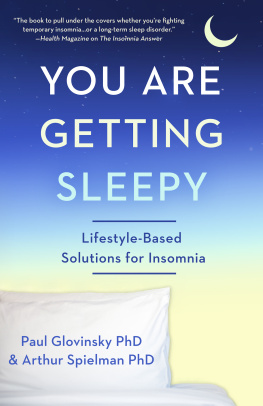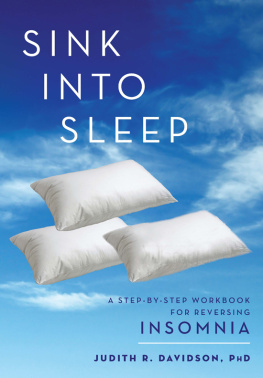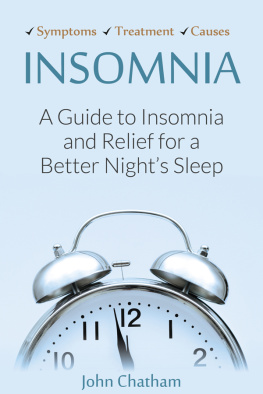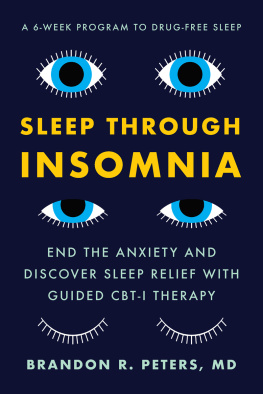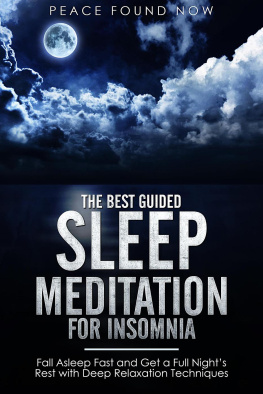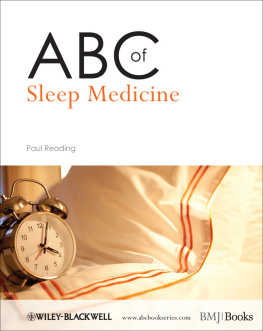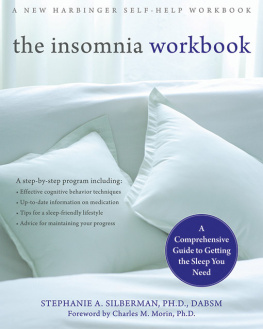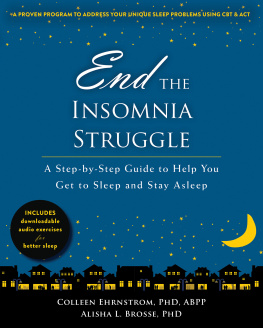For Arthur Spielman, PhD, and Aaron Sher, MD
I met both of you practically the same minute, on a Thursday late in 1979. A second-year grad student, sitting in my first case conference at Montefiore in the Bronx, I was bowled over by two successive waves of fervor. Your shared initials should have tipped me off: not just my working, but my waking hours would be awash in enthusiasm for Anything Sleep. Your distinct means of pursuing understandingthe intrepid intuitions of the theorist, the meticulous probes of the surgeontogether yielded a collegial yin and yang. I threw in my lot with two consummate clinicians, each with a passion for research, each with a great heart. Art and Aaron, I will be forever thankful our work, and our lives, intertwined.
Connect with Diversion Books
Connect with us for information on new titles and authors from Diversion Books, free excerpts, special promotions, contests, and more:
Additional Resources
These books offer cognitive behavioral treatments for insomnia from the perspectives of a number of experienced practitioners:
Carney, Colleen, and Rachel Manber. 2013. Goodnight Mind: Turn off Your Noisy Thoughts and Get a Good Nights Sleep. Oakland, CA: New Harbinger Publications.
Edinger, Jack, and Colleen Carney. 2014. Overcoming Insomnia: A Cognitive-Behavioral Therapy Approach: Workbook. 2nd ed. New York: Oxford University Press.
Glovinsky, Paul, and Arthur Spielman. 2006. The Insomnia Answer: A Personalized Program for Identifying and Overcoming the Three Types of Insomnia. New York: Perigee.
Hauri, Peter, and Shirley Motter Linde. 1996. No More Sleepless Nights. Rev. ed. New York: John Wiley & Sons.
Jacobs, Gregg D. 2009. Say Goodnight to Insomnia: The Six-Week, Drug-Free Program Developed at Harvard Medical School. Updated ed. New York: Holt Paperbacks.
Silberman, Stephanie A. 2009. The Insomnia Workbook: A Comprehensive Guide to Getting the Sleep You Need. Oakland, CA: New Harbinger Publications.
Terman, Michael, and Ian McMahon. 2012. Chronotherapy: Resetting Your Inner Clock to Boost Mood, Alertness and Quality Sleep. New York: Avery Books.
Two popular books covering cognitive restructuring and other aspects of cognitive behavioral therapy for depression:
Burns, David D. 2008. Feeling Good: The New Mood Therapy. New York: Avon Books.
Greenberger, Dennis, and Christine A. Padesky, 2016. Mind Over Mood: Change how you feel by changing the way you think. 2nd ed. New York: The Guilford Press.
Web-based resources for insomnia treatment:
Website of the Society of Behavioral Sleep Medicine, which maintains a roster of certified behavioral sleep medicine practitioners: www.behavioralsleep.org.
Website of the American Academy of Sleep Medicine, which includes a listing of accredited sleep disorders centers: www.aasmnet.org.
Website of the Center for Environmental Therapeutics, which provides detailed information on the use of light therapy based on the work of Michael Terman and colleagues, as well as offering light boxes and other devices for purchase: www.cet.org.
Sleepio, a web-based treatment program for insomnia developed by Colin Espie, a prominent practitioner and theorist in the field, now working with colleagues at the University of Oxford: www.sleepio.com.
The program f.lux, which removes blue light from your electronic devices in the evening, when it inhibits secretion of endogenous melatonin, can be downloaded at: www.justgetflux.com.
Copyright
Diversion Books
A Division of Diversion Publishing Corp.
443 Park Avenue South, Suite 1008
New York, NY 10016
www.DiversionBooks.com
Copyright 2017 by Paul Glovinsky
All rights reserved, including the right to reproduce this book or portions thereof in any form whatsoever.
For more information, email
First Diversion Books edition July 2017
ISBN: 978-1-68230-821-9
INTRODUCTION:
Getting Sleepy is the Way to Sleep
Why read a book about getting sleepy? Sleepiness is a state no one aspires to. Nearly all would agree that getting sleepy is just an irritant, a side effect of being awake too long. Its something to be ignored for as long as possible, or pushed through if necessary. Those of you reading this book are no doubt hoping for more sleepbut certainly not for more sleepiness! In fact, some of you might say you are plenty sleepy already. By day, sleepiness saps your vitality and interferes with your functioning. By night it taunts you by refusing to give way to sleep itself.
Some of you, on the other hand, may be perplexed by your lack of sleepiness. How can you be so hyper, so wired, when you hardly sleep at all? Sure, youd like to be able to wind downbut all the way down, to sleep. Sleepiness you can do without.
Our response to this anticipated chorus of protest is twofold: First, at the risk of being pedantic well note that to be sleepy, in the full sense of the word, implies more than just being drowsy or in need of sleep. It also carries the promise of being inclined to sleep or ready to sleep.
Seen from this vantage, sleepiness is the threshold of sleep. Moreover, it is a portal that can be reached through effort. The willpower required to keep a later bedtime, for example, may lead to sleepiness, as might the mental exercises required to keep a pressing problem at bay until morning. Once you are sleepy, however, you cannot push yourself any further. Poised between the two great states of wakefulness and sleep, you may just have to linger on that threshold for a while. So long as you remain sleepy, sleep will soon enough be ready to receive you.
This appeal to the full sense of sleepy is not just semantics. The Multiple Sleep Latency Test (MSLT), long the sleep fields gold standard when it comes to measuring sleepiness, is thought of as gauging the propensity to sleep. In the MSLT people are essentially put to bed in a dark, quiet room (albeit with lots of monitoring equipment attached), asked to close their eyes, and sleep. Those who fall asleep quickly are officially deemed sleepier than those who do not. So you may be fatigued, exhausted, hyperaroused, exasperated, or many other things as you lie in bed unable to sleep, but you are not really sleepy.
Next well be realists. The second reason we suggest you aim for sleepiness, rather than sleep itself, cuts to the chase of the problem of insomnia: there is no treatment, behavioral or pharmacological, that will ensure that you sleep well on a given night. We emphasized in our 2006 book The Insomnia Answer that sleep can be a maddeningly elusive goal: the harder you try to fall asleep, the less likely you are to be successful. The upshot is that sleep cannot be forced. Ultimately, it must come to you.
The metaphor we used to convey this notion was that of surfers who paddle out into the ocean to catch the wave. They certainly dont go chasing after it. However, surfers still have to make some effort as they position themselves for a good ride. They may need to adjust their approach, for example, to changing weather and shoreline conditions. Similarly, you can learn to position yourself for a good nights sleep. Here is a task where all your hard effort will actually pay off, for you

